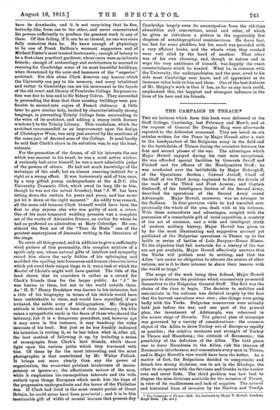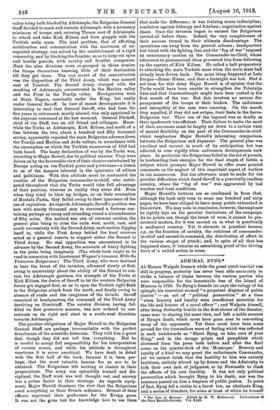THE CAMPAIGN IN THRACE.*
THE six lectures which form this book were delivered at the Staff College, Camberley, last February and March, and at the request of General Sir Douglas Haig were afterwards repeated to the Aldershot command. They are based on six articles written for the Times by Major Howell after a visit to the head'quarters of the Bulgarian army in the field and to the battlefields of Thrace during the armistice between the first and second phases of the war. The advantages which Major Howell enjoyed during his visit were exceptional. He was afforded special facilities by Generals Savoff and Fitcheff and the officers of the Headquarters Staff ; he was conducted over the battlefields by Major Bakargieff, of the Operations Section ; Colonel Jostoff, Chief of the Staff of the Third Army, explained to him the details of the work of the Third and First Armies ; and Captain Stefanoff, of the Intelligence Section of the Second Army, described the operations of the Second Army round Adrianople. Major Howell, moreover, was no stranger to the Balkans. In four previous visits he had travelled over practically the whole of the area dealt with in his lectures. With these antecedents and advantages, coupled with the possession of a remarkable gift of lucid exposition, a mastery of the art of omission, and a wide and intelligent study of modern military history, Major Howell has given us by far the most illuminating and suggestive account yet published of the Bulgarian operations in Thrace up to the battle or series of battles of Lule Burgas—Bursar Hisser. To the objection that full materials for a history of the war are not yet available, Major Howell effectively answers that the Turks will publish next to nothing, and that the Allies "are under no obligation to educate the armies of other nations, nor is it to their interest to share their lessons with the world at large."
The scope of the work being thus defined, Major Howell proceeds to discuss the problems which successively presented themselves to the Bulgarian General Staff. The first was the choice of the time to begin. The decision to mobilize and concentrate in the autumn was dictated largely by the fact that the harvest operations were over ; also things were going badly with the Turks. Bulgarian manoeuvres were actually held just before the war, and one part of the general plan, the investment of Adrianople, was rehearsed in the mimic siege of Shumla. The general plan of campaign was governed by a variety of considerations : the common object of the Allies to drive Turkey out of Europe as rapidly as possible ; the relative weakness and strength of Turkey in Thrace and Macedonia ; the attitude of Roumania ; the possibility of the defection of the Allies. The bold game was to leave Macedonia to the Allies, risk the chances of Roumanian interference, and concentrate every man in Thrace, and in Major Howell's view would have been the better. As a matter of fact, the Bulgarians decided to compromise and detach two strong divisions, one to act in the Rhodope, the other to co-operate with the Servians and Greeks in the weaker area and cover Sofia. The third problem was how best to dispose the nine divisions available for the invasion of Thrace in view of its roadlessness and lack of supplies. The natural and historical lines of invasion by the Maritza and Tundja
• The Campaign in Thrace : 1912. Six Lectures by Major P. Howell. London Hugh Rees. [4e. net.]
valley being both blocked by Adrianople, the Bulgarian General Staff decided to mask and contain Adrianople with a necessary minimum of troops, and, entering Thrace east of Adrianople, to attack and take Kirk Kilisse and then grapple with the Turkish main mass. The next problem, that of effecting mobilization and concentration with the maximum of un- expected strategy, was solved by the establishment of a rigid censorship, and by blocking the frontier, so as to keep out spies and hostile patrols, with cavalry and frontier companies. Next the nine divisions were re-grouped in three armies, the troops themselves knowing little of their destination till they got there. The real secret of the concentration was the disposition of the Third Army, which was massed east of Yamboli. The Second Army, charged with the masking of Adrianople, concentrated in the Maritza valley and the First in the Tundja valley. Headquarters were at Stara Zagora, nominally under the King, but really under General Savoff. In view of recent developments it is interesting to read that General Savoff, who had been for five years in retirement, mostly abroad, was only appointed to the supreme command at the last moment. General Fitcheff, chief of the Staff, was an old friend and colleague. Mean- while the Turks at Adrianople, Kirk Kilisse, and south of a line between the two, about a hundred and fifty thousand strong, apparently expected the main Bulgarian advance down the Tundja and Maritza and Arda valleys, in accordance with the assumption on which the Turkish manoeuvres of 1910 had been based. The hasty declaration of war by the Turks was, according to Major Howell, due to political reasons. They were driven on by the favourable view of their chances entertained by Europe acting on the Turkish press and politicians—a lesson to us of the dangers inherent in the ignorance of editors and politicians. With this attitude must be contrasted the caution of the Bulgarian commander-in-chief, who antici- pated throughout that the Turks would take full advantage of their position, whereas in reality they never did. Even when they tried to blow up bridges, as on their evacuation of Mustafa Pasha, they failed owing to their ignorance of the use of explosives. As regards Adrianople, Savoff's problem was how with ninety thousand men to surround a fortress con- taining perhaps as many and extending round a circumference of fifty miles. His method was one of extreme caution, the general plan being to close the exits west, north, east, and south successively with the Second Army, each section digging itself in, while the First Army behind the local reserves acted as a general reserve to support either the Second or Third Army. No real opposition was encountered in its advance by the Second Army, the accounts of heavy fighting in the press being imaginary. (The whole book ought to be read in connexion with Lieutenant Wagner's romance, With the Victorious Bulgarians.) The Third Army, who were destined to bear the brunt of the invasion, advanced slowly at first, owing to uncertainty about the ability of the Second to con- tain the Adrianople garrison, the strength of the Turks at Kirk Kilisse, the desire of Savoff to let the western Bulgarian forces get engaged first, so as to open the Turkish right flank to the Bulgarian attack from the north, and finally owing to absence of roads and the roughness of the terrain. Savoff remained at headquarters, the command of the Third Army devolving on Dimitrieff. The cavalry division, having ful- filled its first protective mission, was now ordered to con- centrate on its right and start in a south-west direction towards Adrianople.
The peculiar obligations of Major Howell to the Bulgarian General Staff are perhaps irreconcilable with the perfect detachment of the scientific historian. They told him a great deal, though they did not tell him everything. But he is careful to accept full responsibility for his interpretation of certain moves, and while his attitude is throughout courteous it is never uncritical. We have dealt in detail with the first half of the book, because it is here, per- haps, that the most valuable lessons for us are to be obtained. The Bulgarians left nothing to chance in their preparations. The army was splendidly trained and dis- ciplined, the Staff work was well thought out, and secrecy was a prime factor in their strategy. As regards equip- ment, Major Howell dismisses the view that the Bulgarians owed everything to their French ordnance. Several of their officers expressed their preference for the Krupp guns. It was not the guns but the knowledge how to use them that made the difference; it was training versus indiscipline; resolution against lethargy and fatalism; organization against chaos. Once the invasion began in earnest the Bulgarians carried all before them. Indeed, the very completeness of their success turned to their ultimate disadvantage. The operations ran away from the general scheme ; headquarters lost touch with the fighting line, and the "fog of war" imposed an unnecessary caution on the Commander-in-Chief, whose adherence to preconceived ideas prevented him from following up the capture of Kirk Kilisse. He called a halt preparatory to attacking the main Turkish mass when the main mass had already been driven back. The same thing happened at Lule Burgas—Bunar Hissar, and thus a fortnight was lost. Had it not been for this delay Major Howell is of opinion that the Turks would have been unable to strengthen the Tchatalja lines and that Constantinople might have been rushed in the first month of the war. But this involves no serious dis- paragement of the troops or their leaders. The endurance and intrepidity of the men were amazing. On the march they equalled, if they did not eclipse, their feats in the Servo- Bulgarian war. Their use of the bayonet was as deadly as their spadework was efficient. Their failure to make the most of their successes must be largely set down to a certain want of mental flexibility on the part of the Commander-in-chief which emphasizes Major Howell's interesting comparison. between the Bulgarians and Japanese. The general plan was excellent and correct in much of its anticipation, but was adhered to over rigidly when unforeseen developments took place. In particular the Bulgarians failed in the art of pursuit, in husbanding their energies for the final stages of battle, a subject which prompts Major Howell to offer some pointed comments on the neglect of this important aspect of warfare in our manoeuvres. But due allowance must be made for the peculiar difficulties which faced Savoff in a practically roadless country, where the "fog of war" was aggravated by bad weather and local conditions.
Major Howell's lectures are so condensed in form that, although the book only runs to some one hundred and sixty pages, we have been obliged to leave many points untouched in this review. We may note in conclusion, however, the emphasis he rightly lays on the peculiar limitations of the campaign. As he points out, though the latest of wars, it cannot be pro- nounced modern, for it was carried on in what is practically a mediaeval country. Yet it abounds in practical lessons, e.g., on the function of cavalry, the relations of commander- in-chief and second-in-command, the distribution of effort in the various stages of attack ; and, in spite of all that has happened since, it remains an astonishing proof of the driving force of a united nation in arms.



































 Previous page
Previous page